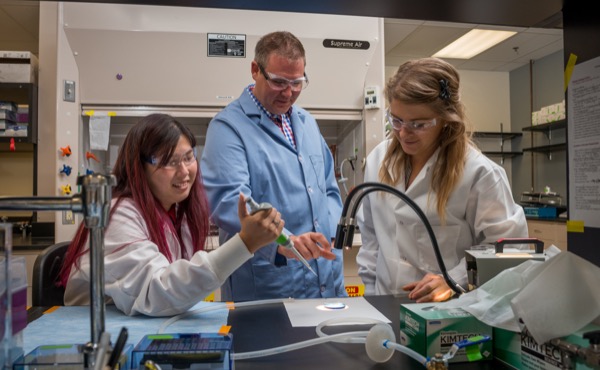


INBRE proposals
Delaware INBRE seeks proposals for Developmental Research Project program
8:51 a.m., Feb. 1, 2016--Delaware INBRE is once again seeking proposals for its Developmental Research Project program, and this year, promising investigators have even more opportunities for collaboration with the goal of becoming established, independent researchers.
“We are pleased to announce that the INBRE Pilot Project applicants will now have three options when putting in a proposal,” said Robert Akins, director of research and mentorship for Delaware INBRE.
Research Stories
Chronic wounds
Prof. Heck's legacy
This round of Delaware INBRE submissions includes two new options that are focused on building a collaborative research environment. Pilot project submission opportunities include:
- Individual research - This is the traditional proposal in which an investigator works independently with a mentor.
- Collaborative research - This option offers two pilot investigators the chance to work synergistically on distinct aspects of a single research program. Each investigator works independently with their own mentor, but they share data and ideas to jointly publish their results and develop a multi-PI R01 or similar application.
- Integrated research team - Multiple pilot investigators work under a senior investigator to develop an integrated program with a focus on securing funding for a larger program, such as a National Institutes of Health (NIH) Center of Biomedical Research Excellence (COBRE). This new approach establishes “Dream Teams” with a multidisciplinary approach across different institutions.
Both the Collaborative Research and Integrated Research team proposals will receive special consideration for funding. Pilot project submissions are due April 15. Those who are selected can expect to begin their projects on Sept. 1. The application is available at de-inbre.org. Questions about the application may be submitted to info@de-inbre.org.
Interested candidates can learn more about the Delaware INBRE Developmental Research Project during two pilot project orientation workshops moderated by Akins, also the director of the Center for Pediatric Clinical Research and Development for Nemours/Alfred I. duPont Hospital for Children.
The first workshop will be held Feb. 24 during the Delaware IDeAs meeting at the University of Delaware’s Clayton Hall. The workshop will begin at 4 p.m. in Room 125.
Interested investigators also can attend a March 10 seminar from 9-10 a.m. in Room A103 of the OSCAR building at Delaware State University.
The goal of the Delaware INBRE program is to develop an interdisciplinary, interinstitutional biomedical research capability across the state. Delaware INBRE, which stands for Delaware IDeA Network of Biomedical Research Excellence, is made up of six partner institutions: University of Delaware, Delaware State University, Wesley College, Delaware Technical Community College, Nemours/Alfred I. duPont Hospital for Children and Christiana Care Health System.
Delaware INBRE Pilot projects must focus on three areas: cancer, cardiovascular and neuroscience research. Proposals that address other significant health challenges in Delaware - infant mortality, incidence of low birth weight, diabetes and obesity - also will be considered if they can be linked to these three focus areas.
“INBRE pilot projects represent a great opportunity to do impactful research that highlights the research capabilities here in Delaware but also improves health outcomes for our residents,” said Steven J. Stanhope, Delaware INBRE principal investigator. “We welcome the chance to help grow the research pipeline in Delaware and help investigators become independent researchers.”
Pilot projects typically reflect one of four stages of biomedical research: development of technologies or methods for assessment or intervention; basic research; translational research; or clinical research. Project applicants typically receive up funding for up to $80,000 each year. Projects are designed to receive funding for up to two years.
In the last decade, Delaware INBRE has received more than $60 million from NIH to build research infrastructure in the state. More than 60 pilot projects have been funded and over 1,000 students have participated in undergraduate summer research opportunities.
Photo by Kathy F. Atkinson









